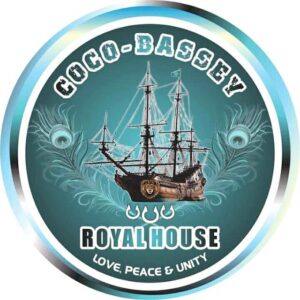
BRIEF HISTORY OF COCO-BASSEY ROYAL HOUSE
(The Family of Late Chief Coco-Otu Abasi Offiong Okoho Effiom Ekpo of the Eyamba Royal Dynasty)
Coco-Otu Abasi Originates from a town in Ibritiam Inokon in Arochukwu, one of the Efiks to depart from the Aro community.
Like King Jaja of Opobo, he was kidnapped by a trader and taken to Amasu, another Inokon town (renamed Okereke), later sold to an Eniong man called Ekpo Nta.
Ekpo Nta, indebted to Otu Bassey (his father), had no money to settle the debt; he substituted the fair-skinned son back to Otu Bassey, who later named him after himself, saying, he was his “Koko” or namesake. Fearing that The Amasu people might retrieve Koko Otu Bassey, Otu Bassey sent him to Duke Town (Old Calabar Town) to live with his father, “Bassey Africa” (Abasi Offiong Okoho Eyamba), a rich Efik and African trader. Bassey Africa handed him over to a white trader called “Wood,” based in Fernando PO (Equatorial Guinea), now known as Bioko Island.This account was confirmed by Late Chief Hannah B. Otudor (Nee Coco-bassey).
Be that as it may, young Coco-Otu Bassey worked in ships and traveled as far as Sierra Leone (known for its white sand beach) in East Africa to many other countries and, in those years, acquired much learning and experience.
The last person under whom he worked was Robert Murray, captain of the ship “ALMANTA,” and it was through him that Coco-Otu Bassey obtained his freedom paper from consult Livingstone.
On his return from Sierra Leone, Coco-Otu Bassey, because of his experience, was set up to take charge of the John Holt Trading Company in Calabar. When the opportunity presented, the first thing he did was build a Storey House for his father, Otu Bassey, in appreciation of what he had done for him.
After doing this, he built his own house at No. 4 Eyamba Street, Calabar, an eloquent testimony of his character and humility.
THE NAME COCO-BASSEY
At that time, he dealt directly with the white Merchants who came into Calabar for trading. Every cash crop of cocoa, palm products, and rubber (after the abolition of the slave trade) was made through him. The white men were always fond of him and nicknamed him after one of his products, cocoa (Coco-Bassey). The name went far and wide.
In 1899, an attempt by Chief Essien Etim Offiong (his closest brother) years after his death to submerge Coco-Otu Bassey’s family under Otu Bassey resulted in a long drawn court case instituted by the Late Chief John Coco-Bassey, Head of the Coco-Otu Bassey family against Chief Essien Etim Offiong (the founder of Essien Town Calabar). Late Chief Coco-Otu Bassey and Late Chief Essien Etim Offiong both founded what is now called Akpabuyo.
The case was won by Chief John Coco-Bassey, who therefore deleted the name “Otu” from Coco-Bassey’s family name. It is now known as the “Coco-Bassey family.”
HIS WEALTH
Coco-Bassey owned vast plantations at Itu, Okobo, and Oron in Akwa Ibom State. In Odukpani, Akpabuyo, Biase, Bakassi, Ikom Local Government Area of Cross River State, he cultivated cocoa, coffees, rubber and palm trees, etc. The products were sold to factories in Europe. He also founded Etehe-Ntem, which was to become his commercial headquarters. Chief John Coco-Bassey leased part of it to the government for bricks production, which was used in Calabar to construct the maximum-security prison. It now houses the State’s Library, some government buildings, and part of Hope Waddel Training Institution’s staff quarters. The British officials who could not pronounce “Etehe-Ntem” called it “BRICK FIELD.”
Late Coco-Bassey had control from Itu, what is now called Akwa Ibom state, and on both banks of Cross River State, including Abia and Ebonyi States. His reach also included other riverine areas of Cross River, Ediba, Usumton, Ebom, Ugep to the hinterland, where he sometimes consolidated his position by marrying into many of the communities. One of such marriages was to the Iya Akpabere (Ikot Akpabere, one of the most prominent families in the Itu Clan), who made vast land available to him.
Other marriages are Mma Ekanem Enyen-owong of Etehe-Ntem, Mma Awa-Okon of Afia-Isong, Nkpanamanwan of Obot Etim, and Mma Awantim of Ikot Awantim, and other ones not mentioned.
Chief Onoyom Iya-Ita of Atan Onoyom, writing his autobiography in 1922, recorded the loss of one of Chief Coco-Bassey in 1889 the Cross River opposite Atan. The other papers of Chief Essien Etim Offiong mentioned that some people sold themselves to him for protection, as was the custom even before his time. He owned numerous canoes and employed men to mann them and his other enterprises.
He was a great merchant, a war-lord and slave dealer till its abolition to the introduction of the legitimate trade. Two of his steamboats, “Offiong” and “Otu Bassey,” transported Bricks from Etehe-Ntem to Calabar. Obong Coco-Bassey was extensively blessed riches, which gave him the title “Obong Okuk,” the (King of Money). Being liberal and generous with his good character, he contributed immensely to many Efik projects and courses.
Obong Nkpanam (a name for his War-lordship) was prominent amongst Efik and other kingdoms, making the Eyamba dynasty wider. He was indeed the pride of the Efik Kingdom in his time.
He was blessed with many children made up of the families in Coco-Bassey Royal House, such as follows:
- John Coco-Bassey
- Etim Offiong Coco-Bassey
- Nnamsowo Coco-Bassey
- Abasi Okon Coco-Bassey
- Otu Coco-Bassey
- Efio-Etim Coco-Bassey
- Ndidieti Coco-Bassey
- Johnson Nkpanam Coco-Bassey
- Essien Ita Coco-Bassey